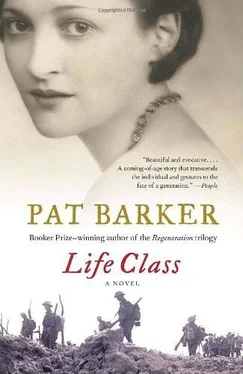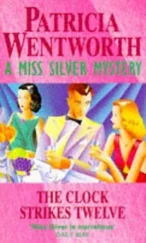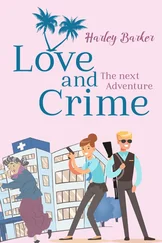After a while he started to drift off again, but time and time, found himself pulled back from the brink. Lewis was asleep now, but the quiet breathing from the next bed drove Paul into a kind of rage. Only now, when he’d lost it, did he begin to realize how much he’d valued the peace and solitude of this hut where, in his off-duty hours, he could read or write letters or draw. Whether he could do any of these things with Lewis around, he rather doubted. He’d never willingly shared a bedroom with anybody, except a lover. There was something about physical intimacy without passion that he found distasteful. Of course, this was a trivial matter in comparison with the great events of the war, but he’d already learned that the war was a compendium of trivial matters, and anyway, this wasn’t trivial to him. He needed space and solitude to go on working. Perhaps it would be possible to rent a room in town? He was always on call, but it might still be worthwhile to get a room and go there on his days off. Just to have somewhere he could draw and think. A cupboard would do.
Meanwhile … Sighing, he turned over again, and finally just as the threadbare light of dawn made itself felt through a crack in the door, he fell into a deep sleep.
Next morning, when Paul opened his eyes, the first thing he saw was Lewis sitting on the end of his bed, fully dressed, smoking a cigarette. Several butts lay scattered on the floor, suggesting he might have been awake some time.
‘What time do we have to be over there?’
Paul looked at his watch. ‘Forty minutes.’
Lewis seemed almost feverish, tensed up to face the day. No sign of the enthusiasm of the previous night. It made Paul feel nervous and irritable to look at him. Reaching for his clothes, he started to get dressed. Lewis got up and paced up and down, though there was hardly enough room for it: three paces either way and you had to turn.
‘You could do that outside.’
Lewis stopped, but his tension was visible in every muscle. He was straining to start work.
‘Breakfast?’ Paul said.
‘I can’t eat.’
‘All right. Watch me.’
Outside it was still dark, the furthest sheds just beginning to show through the thinning grey. Far away, a train whistled. As they set off, Paul felt Lewis veering in the direction of the Salle d’Attente; his feet seemed to head in that direction even as he tried to keep pace with Paul. He kept stumbling. Under the weeds the ground was full of holes.
Paul touched his arm. ‘You’ll feel better for a coffee.’
The dining room was another hut. The food came in huge vats from somewhere off site and was almost inedible, but the coffee, made on site, was good and Paul drank three huge cups of it before forcing himself to eat. Lewis pushed his croissants to one side, but drank the coffee, cupping his hands round the mug. In the strengthening daylight he looked odder: frizzy hair; eyes, that clear pale Viking blue that make their owners look capable of anything; skin so freckled it was almost a deformity. You thought of leopards, snakes, toads. Lewis put down his cup. Mouth as always slightly open, he was staring at Paul, a question on his face. Paul looked quickly down and away.
Burton came over and introduced himself. In the chill morning air, his nose was pinched, his eyes red-rimmed with tiredness. Lewis looked up at him, eager to be impressed. Burton welcomed him ‘on board’, recommended several good restaurants, and then, exactly as Paul had done the previous night, told him where he could get a hot bath and a shave. We’re a disappointment to him, Paul thought, watching Lewis’s politely smiling face, with our talk of percentages and our concern for our own comfort. He’s looking for somebody to hero-worship, and we’re not it. But then he wondered what gave him the confidence, the arrogance, to think he could understand Lewis on the basis of such a slight acquaintance. He might be tougher than he appeared on the surface. He’d better be.
Burton, who’d been the last to arrive, was the first to leave, and his departure signalled a general move across to the sheds. As they walked over the open space, Paul took Lewis to one side and pointed to the road that led away from the station.
‘There, you see?’ A convoy of motor ambulances was churning up the hill. ‘That’s the first of them.’
Paul stared at the road, trying to see it through Lewis’s eyes. Motor lorries, horse-drawn wagons coming back from delivering the rations, a column of men marching. All along the horizon, guns rumbled and flickered. Occasionally a flare went up, illuminating a bank of black cloud.
‘Can you get up there?’ Lewis asked.
‘Not easily. I suppose an ambulance driver might give you a lift.’
‘I’d like to go.’
‘Drive an ambulance and you will. Meanwhile …’ He put his hand on Lewis’s shoulder. ‘There’s work to be done.’
An hour later the black clouds are overhead. The wind rocks and shakes the roof; rain pelts down, sending waves of turbulence around the room. Outside, ambulances roar, cough, hiccup, splutter, stop, unload the wounded and drive off again, churning the mud in the turning circle to thick brownish-black cream. By mid-afternoon every available space in the hut’s been filled. Paul, Lewis and three other orderlies move up and down the rows of stretchers, cutting men out of their uniforms, washing them, ignoring their pleas for water if they’re going to the operating theatres, letting them have it if they’re slight wounds who can wait, or beyond hope. The most severely wounded moan on the edge of consciousness or lie in ominous silence. Continually, throughout the day, the procession of wounded comes. Each time the leading stretcher-bearer holds the door open, a current of cold air rushes in, damp and brackish-smelling, as if even the outside world’s underground. And the gust of wind flutters the papers in Sister Byrd’s hand and lifts the edges of the blankets.
Lewis follows Paul round, watching and copying everything he does. Once his shadow falls across Paul’s hands at a crucial moment and Paul swears at him and sees him flinch. He learns quickly though, his hands are strong and deft, he doesn’t tire, or anyway shows no sign of it, though he must be suffering from backache now, as they all are, bending and lifting the stretchers hour after hour. No, Lewis’s problems are all in his head. Some of the things Sister Byrd says — ‘Take that stomach in next, and then the head’ — visibly shock him. ‘Look,’ Paul imagines saying to him, ‘Leave your fucking compassion at the door, it’s no use to anybody here.’
He’s roused from his trance by a commotion at the door. Another stretcher’s just been brought in. Hearing raised voices, Sister Byrd goes to investigate. The man on the stretcher waits till she’s leaning over him and spits a gob of blood into her face.
Paul’s on his way over, before she calls for him. Lewis, as always, follows. Paul turns to tell him to go on washing the patient he’s just left, but Sister Byrd says, ‘No, it’ll take two.’ The man’s bucking and rearing against the straps that bind him. ‘You’ve got a right one there,’ the front bearer says, jovial now he’s succeeded in dumping the problem on to somebody else. Wiping the blood from her face, Sister Byrd turns to the driver, who, unusually, has come in with the bearers. ‘He tried to jump out of the back of the ambulance,’ the driver says. ‘We had to tie him down.’
Blood wells from the man’s mouth, great thick black gobbets of blood. As he turns his head in the direction of their voices, his left eyeball swings against his cheek.
‘Will he live?’ Paul asks.
She shrugs. They carry him through into theatre, Sister Byrd hurrying ahead to warn the surgical team. Paul takes the front of the stretcher, Lewis the rear, though they have to keep stopping, because the man kicks and struggles so much he’s in danger of tipping himself on to the floor. His eyeball swings with every jolt.
Читать дальше












